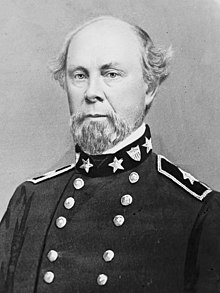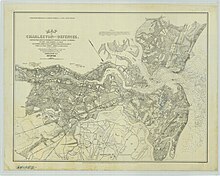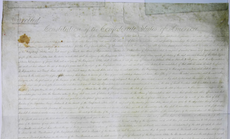Robert Barnwell Rhett
Robert Barnwell Rhett | |
|---|---|
 | |
| Deputy to theProvisional C.S. Congress fromSouth Carolina | |
| In office February 4, 1861 – February 18, 1862 | |
| Preceded by | Position established |
| Succeeded by | Position abolished |
| United States Senator fromSouth Carolina | |
| In office December 18, 1850 – May 7, 1852 | |
| Preceded by | Robert Barnwell |
| Succeeded by | William de Saussure |
| Member of the U.S. House of Representatives fromSouth Carolina | |
| In office March 4, 1837 – March 3, 1849 | |
| Preceded by | William Grayson |
| Succeeded by | William Colcock |
| Constituency | 2nd district(1837–43) 7th district(1843–49) |
| 8thAttorney General of South Carolina | |
| In office November 29, 1832 – March 4, 1837 | |
| Governor | Robert Hayne George McDuffie Pierce Butler |
| Preceded by | Hugh S. Legaré |
| Succeeded by | Henry Bailey |
| Member of the South Carolina House of Representatives fromSt. Bartholomew's Parish | |
| In office November 27, 1826 – November 29, 1832 | |
| Personal details | |
| Born | Robert Barnwell Smith December 21, 1800 Beaufort, South Carolina |
| Died | September 14, 1876(aged 75) St. James Parish, Louisiana |
| Resting place | Magnolia Cemetery, Charleston, South Carolina |
| Nationality | American |
| Political party | Democratic |
| Other political affiliations | Southern National Party |
| Relations | R. Barnwell Rhett Jr.(son),Alfred M. Rhett(son),Alicia Rhett(great-granddaughter) |
| Occupation | Politician,lawyer,planter,andnewspaper publisher |
Robert Barnwell Rhett(bornRobert Barnwell Smith;December 21, 1800 – September 14, 1876) was an Americanpoliticianwho served as a deputy fromSouth Carolinato theProvisional Confederate States Congressfrom 1861 to 1862, a member of theUS House of Representativesfrom South Carolina from 1837 to 1849, andUS Senatorfrom South Carolina from 1850 to 1852. As a staunch supporter of slavery and an early advocate ofsecession,he was a "Fire-Eater",nicknamed the" father of secession ".
Rhett published his views through his newspaper, theCharleston Mercury.[1]
His sonAlfred M. Rhettcommanded a battery at Fort Moultrie at the time of the bombardment of Fort Sumter.[2]
Early life
[edit]Rhett was born Robert Barnwell Smith inBeaufort,South Carolina, United States. He later studied law.
Rhett was of English ancestry. On his mother's side, he was related to U.S. RepresentativeRobert Barnwell(his great-uncle) and SenatorRobert Woodward Barnwell(son of Robert). A cousin of the Barnwells was the wife ofAlexander Garden.[3]
Early career
[edit]Rhett was a member of the South Carolina legislature from 1826 until 1832, and was extremely pro-slavery in his views. At the end of theNullification Crisisin 1833, he told the South Carolina Nullification Convention:
A people, owning slaves, are mad, or worse than mad, who do not hold their destinies in their own hands.[4]
In 1832, Rhett becameSouth Carolina's Attorney General,serving until 1837. He was then elected a US Representative and served until 1849. In 1838, he changed his last name from Smith to that of a prominent colonial ancestor, ColonelWilliam Rhett.
Rhett objected vehemently to the protectionistTariff of 1842.
Support for secession
[edit]On July 31, 1844, Rhett launched theBluffton Movement,which called for South Carolina to return to nullification or else declare secession. It was soon repudiated by more moderate South Carolina Democrats, including even SenatorJohn C. Calhoun,who feared it would endanger the presidential candidacy ofJames K. Polk.
Rhett opposed theCompromise of 1850as against the interests of the slave-holding South. He joined fellow Fire-Eaters at theNashville Conventionof 1850, which failed to endorse his aim of secession for the whole South. After the Nashville Convention, Rhett,William Lowndes Yancey,and a few others met inMacon,Georgiaon August 21, 1850, and formed the short-lived Southern National Party. In December 1850, he was appointed to be a U.S. Senator to complete the term left by the death of Calhoun. He continued to advocate secession in response to the Compromise, but in 1852, South Carolina refrained from declaring secession and merely passed an ordinance declaring a state's right to secede. Disappointed, he resigned his Senate seat.
He continued to express his fiery secessionist sentiments through theCharleston Mercury,now edited by his son,Robert Barnwell Rhett Jr.
The1860 Democratic National Conventionmet inCharleston,South Carolinaand a large bloc of Southern delegates walked out when the platform was insufficiently pro-slavery. That led to the division of the party and separate Northern and Southern nominees for president, which practically guaranteed the election of an anti-slaveryRepublican,which in turn triggered declarations of secession in seven states. During the1860 presidential campaign,a widely credited report in theNashville Patriotsaid that the outcome was the intended result of a conspiracy by Rhett, Yancey, andWilliam Porcher Mileshatched at the Southern Convention inMontgomery, Alabamain May 1858.[5]One 20th-century historian called the scheme the work of "Rhett–Yancey–Keittextremists. "[6]
Confederate States
[edit]
After the election of the Republican Party's candidate,Abraham Lincoln,Rhett was elected to the South Carolina Secession Convention, which declared secession in December. He was chosen as deputy from South Carolina to the Provisional Confederate States Congress in Montgomery. He was one of the most active deputies and was the chairman of the committee that reported theConfederate States Constitution.He was then elected to theConfederate House of Representatives.He received no higher office in the Confederate government and returned to South Carolina. During the rest of theCivil War,he sharply criticized the policies ofConfederate PresidentJefferson Davis.
In October 1865, Confederate military officerP.G.T. Beauregardwrote to Rhett encouraging him to resume publication of theCharleston Mercury"to help in re-establishing the truths of History. It will be difficult, even for many of our own people, to believe that so glorious a cause as the one we fought for should have been sacrificed by the prejudices & want of judgment & foresight of one man [Jefferson Davis]! Yet such was the fact, according to my most deliberate opinion."[7]
Death
[edit]Rhett struggled with skin cancer for many years, including a "cancerous growth on his nose which terribly disfigured him and also affected his general health in the years after the war."[7]After the war, Rhett settled inLouisiana.He died inSt. James Parish,Louisiana,and is interred atMagnolia Cemeteryin Charleston, South Carolina.
Legacy
[edit]TheRobert Barnwell Rhett Housein Charleston was declared aNational Historic Landmarkin 1973.[8][9]
See also
[edit]- List of slave owners
- List of United States representatives from South Carolina
- List of United States senators from South Carolina
References
[edit]Notes
- ^The SecessionArchivedMarch 6, 2017, at theWayback MachineCharlestonNews and Courier.December 18, 1960
- ^Island, Mailing Address: 1214 Middle Street Sullivan's; Us, SC 29482 Phone:577-0242 Contact."Alfred M. Rhett - Fort Sumter and Fort Moultrie National Historical Park (U.S. National Park Service)".www.nps.gov.RetrievedAugust 7,2023.
{{cite web}}:CS1 maint: numeric names: authors list (link) - ^Davis, William C.(2001).Rhett: The Turbulent Life and Times of a Fire-Eater.Columbia, S.C.:University of South Carolina Press.p. 1.ISBN978-1-57003-439-8.
- ^Freehling, William W.Prelude to Civil War: The Nullification Crisis in South Carolina 1816-1836,p. 297.
- ^Allan Nevins,The War for the Union,vol. 1:The Improvised War, 1861-1862(New York: Charles Scribner's Sons, 1959), p. 28.
- ^Roseboom, Eugene H.; Crenshaw., Ollinger (September 1947)."The Slave States in the Presidential Election of 1860".The Mississippi Valley Historical Review.34(2): 307.doi:10.2307/1896188.JSTOR1896188.
- ^ab"Caroliniana Society Annual Gifts Report - April 2010".University South Caroliniana Society.University of South Carolina Libraries. April 1, 2010.
- ^"Robert Barnwell Rhett House".National Historic Landmark summary listing.National Park Service. Archived fromthe originalon June 6, 2011.RetrievedMarch 16,2008.
- ^Levy, Benjamin (January 29, 1973)."National Register of Historic Places Inventory-Nomination"(pdf).National Park Service.
{{cite journal}}:Cite journal requires|journal=(help)andAccompanying two photos, exterior, from 1973(32 KB)
Further reading
- Rhett, Robert Barnwell (2000).Davis, William C.(ed.).A Fire-Eater Remembers: The Confederate Memoir of Robert Barnwell Rhett.Columbia, S.C.:University of South Carolina Press.ISBN978-1-57003-348-3.
- Scarborough, William K., "Propagandists for Secession: Edmund Ruffin of Virginia and Robert Barnwell Rhett of South Carolina",South Carolina Historical Magazine112 (July–Oct. 2011), 126–38.
- White, Laura A. (1931)Robert Barnwell Rhett: Father of Secession
External links
[edit]- 1800 births
- 1876 deaths
- 19th-century American newspaper publishers (people)
- 19th-century American politicians
- 19th-century American planters
- Burials in South Carolina
- Democratic Party members of the United States House of Representatives from South Carolina
- Democratic Party United States senators from South Carolina
- Deputies and delegates to the Provisional Congress of the Confederate States
- Members of the Confederate House of Representatives from South Carolina
- Democratic Party members of the South Carolina House of Representatives
- Nullification crisis
- People from Beaufort, South Carolina
- Signers of the Confederate States Constitution
- Signers of the Provisional Constitution of the Confederate States
- South Carolina attorneys general
- South Carolina lawyers
- Fire-Eaters
- Burials at Magnolia Cemetery (Charleston, South Carolina)
- United States senators who owned slaves
- Members of the United States House of Representatives who owned slaves
- University of South Carolina Beaufort alumni


